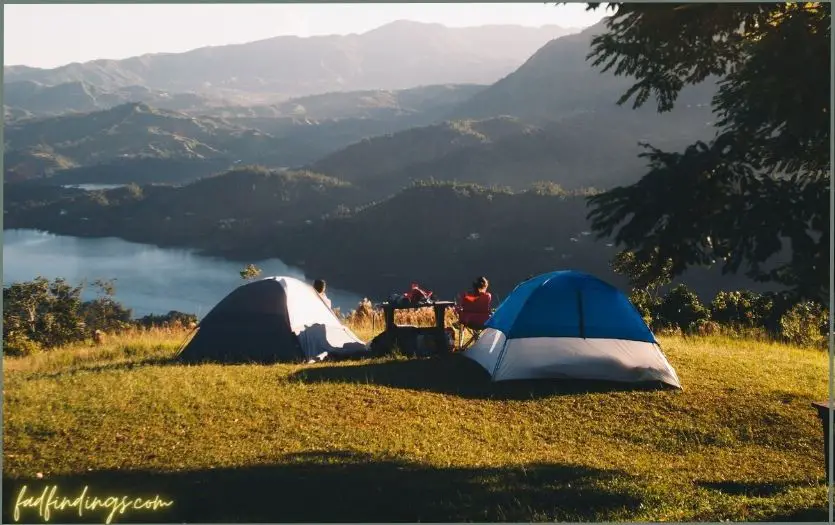You're Not Bear Grylls, So Here's a Simple Guide on Camping Safety
Camping can be a fun and exciting adventure, but it can also be dangerous without proper preparation. Discover expert advice on camping safety and enjoy your trip with peace of mind.
Picture this: You're deep in the wilderness, surrounded by towering trees and pristine lakes. You've got your trusty camping gear, some snacks, and a sense of adventure. But as you settle in for the night, you start to wonder...are you really prepared for anything that might come your way?
Camping can be an amazing way to connect with nature and unplug from the daily grind. But it's also important to remember that the wilderness can be a dangerous place. From wildlife encounters to sudden storms, there are plenty of hazards that can catch even the most experienced camper off guard.
That's why we've put together this guide to camping safety. We'll cover everything you need to know to stay safe and prepared on your next camping trip, from packing the right gear to handling emergencies.
So grab a cup of coffee, sit back, and get ready to learn how to make your next camping adventure a safe and unforgettable one!
Choosing the Right Location for Camping
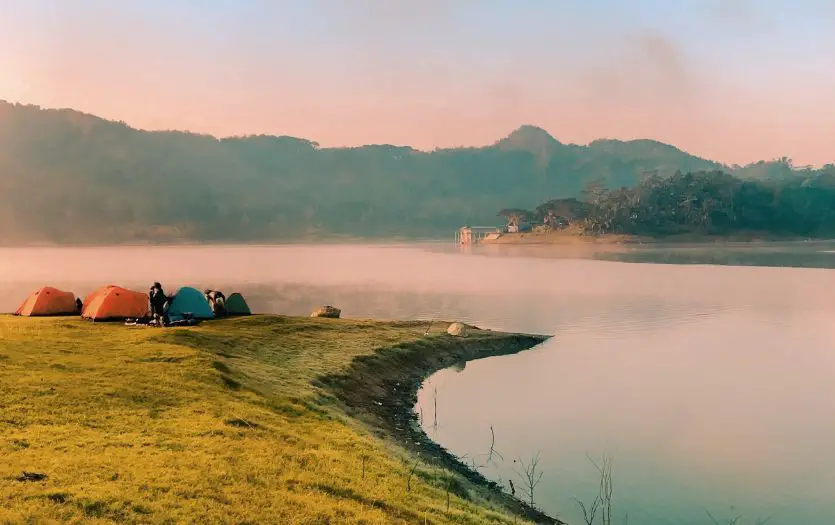
When it comes to camping, choosing the right location is essential for a safe and enjoyable experience. There are several factors to consider when selecting a campsite, including researching campsites, evaluating safety factors, and selecting the best campsite.
Researching Campsites
When researching campsites, it's important to familiarize yourself with the area. This includes learning about nearby amenities and facilities such as restrooms or showers. Additionally, you should check if there are any restrictions on campfires or other activities in the area.
And if you are dry camping or camping in the wild be sure to check about your location for any wildlife in the area and any other challenges.
Evaluating Safety Factors
When evaluating the safety factors of potential campsites, it's important to consider weather conditions in the area. You should also be aware of any wildlife that may be present in the area and how close you are to safety services such as hospitals or police stations.
Selecting the Best Campsite
Once you've narrowed down your choices based on research and safety considerations, it's time to select the best campsite. Look for flat and level ground that is free from hazards such as cliffs or rivers. Additionally, make sure there is a water source nearby so you can stay hydrated during your trip.
Camping can be an incredibly rewarding experience when done safely. By taking the time to research potential locations and evaluate safety factors before selecting a campsite, you can ensure that your next camping trip will be both safe and enjoyable!
Preparing Your Camping Gear for a Safe and Enjoyable Trip
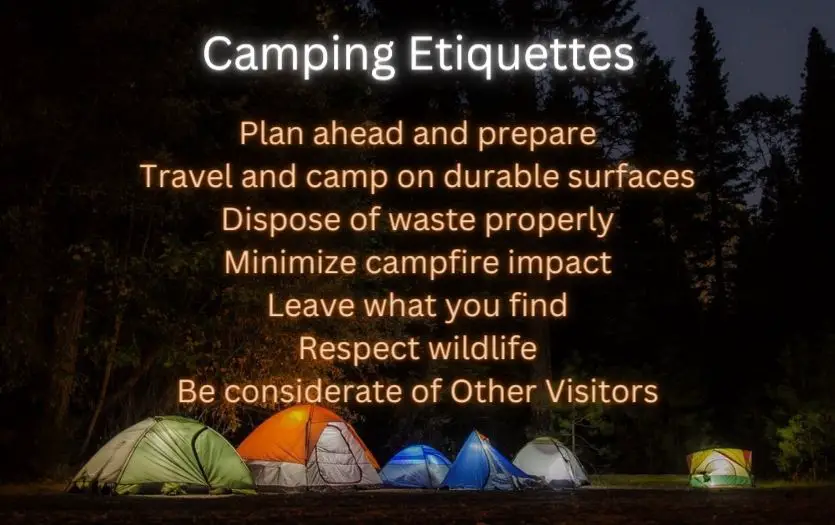
Camping is a great way to explore the outdoors and spend some time in nature. However, before you set off on your camping trip, it's important to make sure that you have all the gear you need to stay safe and comfortable. Let's break it down further:
Essential Camping Equipment
When preparing your camping gear, there are some essential items that you cannot afford to forget. These include:
1. Tent
Your tent will be your home away from home when camping. It's important to make sure that you have a tent that is big enough to comfortably accommodate the number of people you will be camping with. Additionally, make sure that your tent is weather-resistant, with a waterproof rainfly, and good ventilation to prevent condensation.
2. Sleeping Gear
A good night's sleep is essential when camping, and having the right sleeping gear is crucial for this. Make sure to pack a sleeping bag, sleeping pad or air mattress (or both), and one or more camping pillows that match the climate conditions of your trip. Sleeping gear that keeps you warm and comfortable is a must-have.
3. Cooking Supplies
Cooking supplies such as portable stoves, propane gas, pots, pans, utensils, and plates are essential for cooking meals in the great outdoors. Packable water containers are also important for carrying water when there is no water source available at the campsite.
4. First Aid Kit
A well-stocked first aid kit is a must-have for any camping trip. It should include items such as bandages, gauze, antiseptic wipes, insect repellent, sunscreen, pain relievers, and any necessary prescription medications.
If you love adrenalin rush, also check out our article on Cliff Camping
Personal Safety Items
In addition to essential camping gear, you should also pack personal safety items to protect yourself from the elements and potential hazards. These include:
1. Proper Clothing and Footwear
Always pack clothes and footwear suitable for camping. Depending on the weather conditions, bring the necessary clothes for warmth, coolness, or protection from the elements. It's important to choose layers that can be easily added or removed based on changing weather conditions.
2. Extra Layers for Warmth
It can get chilly at night, even in the summer. Pack extra layers such as jackets, gloves, and hats to keep you warm on cold nights.
3. RainGear
Weather conditions can change quickly in the great outdoors, so it's important to be prepared for rain or storms. Always remember to pack rain gear such as waterproof jackets and pants or ponchos.
Ignite your hunting success and take your hunting skills to new heights with our expert-crafted hunting plan!
Communication Tools and Emergency Equipment
In case of emergencies, it's important to pack communication tools and emergency equipment. These include:
1. Cell Phone and Charger
Keep your cell phone with you at all times, and don't forget to bring a portable charger. It's important to have a way of communicating with others in case of emergencies. Alternatively, you can bring a satellite phone or radio device.
2. Maps and Compass
Even in today's digital world, maps and compasses are still important tools to have when camping. Be sure to pack a physical map of the area you'll be camping in, as well as a compass to help navigate your way around.
3. Whistle and Flashlight
Whistles are great for attracting attention in case of emergencies and can be heard over long distances. Don't forget to pack a reliable flashlight or headlamp to help navigate the campsite in the dark.
Camping is an incredible experience, but it's crucial to prepare and pack the right gear to stay safe and comfortable. By packing the essential camping gear, personal safety items, communication tools, and emergency equipment, you'll have everything you need to enjoy the great outdoors while staying safe and sound.
Campfire Safety
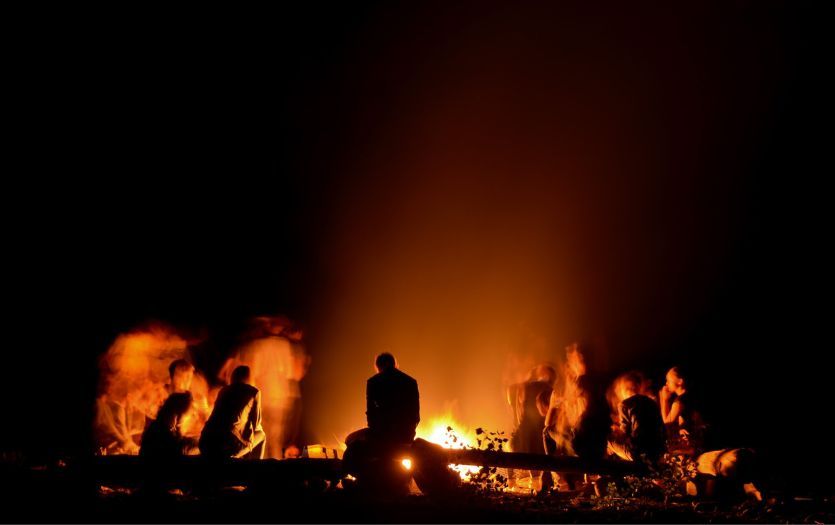
Whether you’re camping in the woods, on the beach, or in your backyard, it’s important to practice safety when building and using campfires. Here are some tips for choosing a safe spot for your campfire, building it safely, and extinguishing it properly.
Choosing a Safe Spot for a Campfire
Before you start building your campfire, make sure that fires are allowed in the area where you’re camping. Check with local authorities or park rangers to find out if there are any fire restrictions in place.
Once you know that fires are allowed, choose an open area away from flammable materials such as logs, brushes, or decaying leaves and needles. Make sure that your fire is at least 15 feet away from tents and other structures.
Building a Fire Safely
When building your fire, use only designated fire rings or pits. These pits will help contain the fire and keep it from spreading to nearby areas. If there isn’t an existing pit available, build one yourself by digging into the ground and surrounding it with rocks.
When gathering wood for your fire, remember to be responsible about it – don’t take more than you need! Use only local sources of wood such as fallen branches or dead trees; don’t cut down live trees or pick up wood from other campsites.
Extinguishing the Fire Properly
Once you’re done with your campfire, make sure that you extinguish it properly before going to bed or leaving the area. The best way to put out a campfire is by using water or dirt.
Pour plenty of water over the coals until they are no longer hot to the touch; stir them around with a stick until all of the embers have been extinguished. Once you think that all of the embers have been put out, pour more water over them just to be sure – never leave a smoldering fire unattended!
Campfires can be fun when done safely – just remember these tips next time you go camping! With proper planning and preparation, you can ensure that everyone has an enjoyable time while staying safe around the campfire.
Wildlife Awareness and Encounters
When camping in the wild, it's important to be aware of your surroundings and the local wildlife. Knowing which animals to watch out for, their behavior and habits, as well as how to respond to a wildlife encounter can help keep you safe and make your camping experience more enjoyable.
Researching the Local Wildlife
The first step in staying safe while camping is researching the presence of wild animals near your campsite. Knowing which animals are native to the area you're visiting can help you prepare for potential encounters. You can find this information by talking to park rangers or other experienced campers, or by doing research online.
Knowing Which Animals To Watch Out For
Once you know which animals are native to the area, it's important to learn about the animal's behavior and habits so that you can recognize when one is nearby. Different animals have different warning signs that they may be present, such as tracks, scat (animal droppings), nests, burrows, or even sounds they make. Being able to identify these signs will help you stay alert and avoid any dangerous encounters with wildlife.
It is also important to understand their nature, some animals may become aggressive if they feel threatened or if their young are nearby. Knowing this information ahead of time can help you stay safe if an animal does approach your campsite.
Food Storage And Handling
Food storage and handling is another important aspect of camping safety when it comes to wildlife awareness and encounters. Separate raw foods from your cooked meals and store them properly to prevent animals from being attracted to your campsite.
This includes using bear-resistant containers or hanging food away from sleeping areas at least 10 feet off the ground and 4 feet away from tree trunks or other supports. It's also important to keep cooking and sleeping areas separate so that animals don't become accustomed to humans being around food sources.
Responding To A Wildlife Encounter
If an animal does approach your campsite, it's important to know how to react appropriately to stay safe while still respecting the animal's space. Depending on the type of animal involved, there are various safety techniques and tools (e.g., bear spray) that can be used to protect yourself without harming the animal or putting yourself at risk of injury or death.
It's also helpful to know what kind of noises or movements might scare away certain animals so that you can take action if needed without putting yourself in danger.
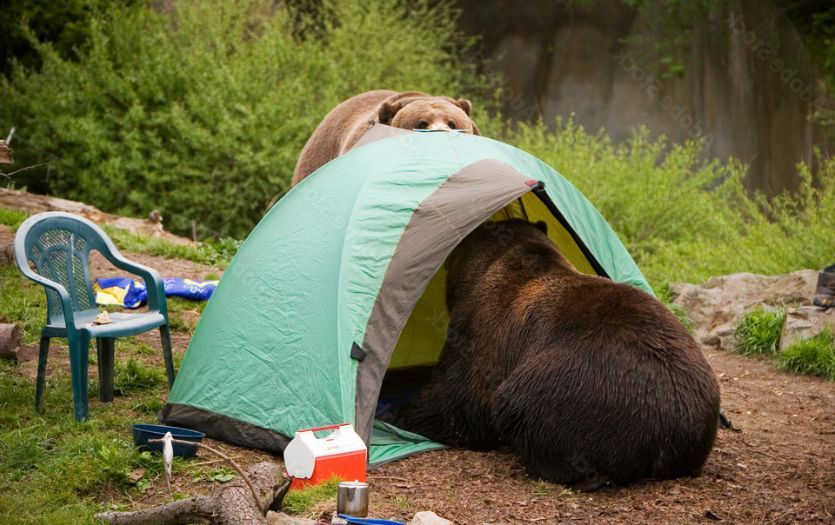
Emergency Preparedness During Camping
Whether you're a first-time camper or an experienced outdoorsman, when it comes to camping, safety should always be your top priority. Apart from the camping safety tips we mentioned above, it's important to make sure you're prepared for any unexpected emergency that may arise.
Preparing for Emergencies
The key to staying safe while camping is being prepared for any situation that may arise. Here are some tips on how to prepare for emergencies:
Understanding Your Surroundings
Before setting up camp, take a few minutes to familiarize yourself with your surroundings. Pay attention to potential hazards like steep slopes, bodies of water, and wildlife. Knowing the lay of the land can help you avoid dangerous situations and prepare for any potential emergencies.
Knowing Basic First Aid
It's important to have a basic understanding of first aid in case someone gets injured or sick while camping. Make sure everyone in your group knows how to administer basic first aid treatments such as cleaning and bandaging wounds, treating burns, and recognizing signs of shock or heat exhaustion.
Carrying Emergency Supplies
Make sure you bring along essential supplies like flashlights, extra batteries, fire starters, a first aid kit, insect repellent, sunscreen, and extra clothing in case of an emergency. It's also a good idea to carry a map and compass so you can find your way back if needed.
Responding To Emergencies
If an emergency does occur while camping, it's important to stay calm and act quickly. Here are some tips on how to respond:
Evacuation Procedures
If there is an imminent danger such as a wildfire or severe weather event, make sure that your fellow campers know the evacuation procedures beforehand so they can act quickly if needed. Have designated meeting points where everyone can gather if they become separated during the evacuation process.
Dealing With Injuries And Illnesses
If someone in your group becomes injured or ill while camping, make sure they receive proper medical attention as soon as possible. If necessary call 911 or contact local search and rescue teams for assistance. Be aware of any allergies or medical conditions that could complicate treatment before heading out on your trip so you know what steps need to be taken if an emergency arises.
Lost Or Missing Persons
If someone in your group becomes lost or missing during a camping trip it's important not to panic but instead take immediate action by contacting local authorities right away with information about the person who is missing including their description and last known whereabouts. Having a communication plan set up beforehand will help ensure that everyone stays safe during the search process.
Camping Safety Tips at a Glance
- Plan ahead and research the area where you'll be camping.
- Always carry a first-aid kit and know how to use it.
- Keep your campsite clean and free of food waste.
- Check the weather forecast and be prepared for changes in conditions.
- Never leave a campfire unattended and always fully extinguish it before leaving.
- Keep a safe distance from wildlife and never feed them.
- Bring plenty of water and stay hydrated.
- Learn basic navigation skills and always carry a map and compass.
- Use fuel-burning appliances inside your tent or camper with caution to prevent carbon monoxide poisoning.
- Handle food properly and be aware of the risks of contaminated food.
Final Thoughts
As we wrap up this informative article on camping safety, one thing is clear: camping is an amazing experience that everyone should enjoy. However, it's crucial to take the necessary precautions to ensure that your trip is safe and enjoyable. From setting up camp in the right location to packing the right gear and knowing how to handle wildlife encounters, we hope this article has given you a good foundation for safe camping practices.
But before you hit the great outdoors, don't forget to check out our articles on the best camping gear to prepare for the summer camping season. From tents to sleeping bags, we've got you covered with everything you need to make your next camping trip a success.
So, get out there, explore the beauty of nature, and stay safe!
